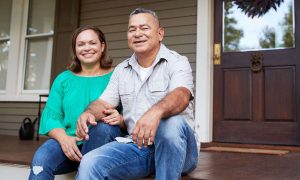When you own a home, the thought of a mortgage looming over your head for decades can be daunting for many people, so it’s natural to want to pay off your mortgage as soon as possible. Before you decide to use an inheritance, raise or your savings to pay off your mortgage (or even before you decide to make extra payments), it’s important to determine whether it really makes financial sense for you.
In some cases, the amount you save on interest when you pay off your mortgage early might not be more than what you would earn if you put the money to work elsewhere. On the other hand, sometimes it’s not about the return on other investments and more about peace of mind or freeing up cash flow for other opportunities. Paying off your mortgage isn’t always the best use of a windfall, but the decision comes down to what matters most to you: a potentially better investment, or eliminating the debt.
Can you pay off your mortgage early?
If you’re considering paying off your mortgage early, first contact your mortgage lender or servicer. Based on the terms of your loan, you might find out you’re subject to a prepayment penalty if you pay off your mortgage sooner than your payment schedule spells out, or that you can only make payments within certain parameters.
The prepayment penalty on a mortgage can be 2 percent of the loan balance within the first two years of your mortgage, and 1 percent thereafter. Knowing this information upfront can help you map out a payoff plan that works for you and your lender or servicer.
Paying off your mortgage early: What to consider
1. Will other investments beat paying off a mortgage early?
Your biggest consideration might be whether to pay off your mortgage or invest. What if, instead of putting money into getting rid of your mortgage early, you invested the cash elsewhere?
“Sadly, the math tells us it’s almost always better to invest in other places than in your mortgage,” says Richard Bowen, CPA and owner of Bowen Accounting in Bakersfield, California.
Mortgage rates are lower than they’ve been in recent years, so if paying off your mortgage early leads to a return equal to your interest rate, that return would likely be lackluster compared to the annualized return for the S&P 500 – roughly 10 percent over the last 90 years.
A potentially better use of the funds might be to take the cash you’d use to pay off your mortgage and leverage it into buying a cash flow-positive property like multi-family real estate or single-family homes that have the potential to offer higher long-term returns, Bowen points out.
Any choice poses a risk, however. Even after paying off your mortgage early, real estate prices could plunge, leaving you with a potential loss. Carefully consider which risks you’re willing to take. Ultimately, you might be better off not paying your mortgage off early.
“The thing is, no one can give you a guarantee on an investment,” Bowen cautions. “You can put your money in the stock market and lose it. You can put your money in real estate and it doesn’t perform as well as you expected it to.”
2. Will all your cash be tied up in the mortgage?
Before taking a large chunk of your wealth and using it to pay off your mortgage early, don’t forget to look at liquidity. Your home is considered a non-liquid asset because it can take months – or longer – to sell the property and access the capital.
“If you start paying down your mortgage too fast, you risk depleting your liquidity,” says Amanda Thomas, CFP, a client advisor at Mission Wealth in Santa Barbara, California. “The kind of liquidity you have is important, too.”
One approach is to have an emergency fund, as well as assets like stocks, mutual funds, U.S. Treasuries, bonds and marketable securities available in a taxable investment account. That way, in addition to having money tied up in tax-advantaged retirement accounts and your home, you still have some liquid cash or other investments that are easy to convert to cash in a pinch.
Bowen suggests maintaining a cushion that protects you for at least six months before you consider using a large portion of your liquidity to retire your mortgage early.
3. How will you use the money if you don’t pay off your mortgage early?
Be realistic about what you’re likely to do with your money if you don’t use it to pay off your mortgage early. After the mortgage is paid off, will you actually use it to get ahead?
It might make sense, for example, to put the money into paying off your mortgage early if you struggle with keeping money in the bank. Your home can be a forced-savings tool, and making extra mortgage payments can save you thousands of dollars in interest over time, plus help you build equity in your home faster.
“The right thing to do is the thing you will do,” Bowen says. “All of this has to do with personal habits. If you’re going to blow through the extra money anyway, then it’s better that you put it into your house than spend it.”
4. How much do you value peace of mind?
Sometimes it’s less about the bottom line and more about peace of mind. If you own your home free and clear, that can provide benefits that can’t be measured in strictly financial terms. For many, eliminating a monthly mortgage payment ahead of retirement can provide mental relief when considering living on a fixed income.
“Personally, I’m paying down my mortgage,” says Thomas of Mission Wealth. “It feels good to have it paid off before retirement. It might not always make financial sense, but it offers peace of mind and it might allow for better budgeting.”
Another potential advantage is the ability to borrow against the equity in your home. Having a considerable amount of equity can allow you to establish a home equity line of credit (HELOC), providing a source of emergency income, as well as allowing you to make home improvements or make progress toward other financial goals.
Pros and cons of paying off your mortgage early
Pros
- Eliminates your monthly mortgage payment, freeing up cash flow that can be useful, especially during retirement
- Saves you money on interest, potentially thousands of dollars
- Can receive a predictable rate of return, equal to the interest rate on the balance you’re paying off
- Grants peace of mind knowing you own your home outright
- Can tap the equity in your home if you need money later
Cons
- Ties up a good chunk of your liquidity and net worth in your home, which might make it harder to access later
- No longer eligible for the federal mortgage interest tax deduction
- Could miss out on potential higher returns from other investments
- Might not realize as much from your home as you had hoped if the market drops and you have to sell quickly
How to pay off your mortgage early
If paying off your mortgage early is right for you, here are some strategies to do it:
- Make biweekly payments. One way to get started with making extra mortgage payments is to set up a biweekly schedule. This amounts to making a full extra monthly payment each year and can reduce the time spent with a mortgage. Starting with biweekly payments can help you get ahead on your mortgage while allowing you to keep working toward other financial goals.
- Make an extra mortgage payment each year. Similar to making biweekly payments, you can simply make an extra mortgage payment once a year.
- Refinance to a mortgage with a shorter term. If you stand to get a lower interest rate, refinancing to a 15-year mortgage means you’ll pay off the loan sooner. Keep in mind that even with a lower rate, you could be paying more each month, since your payments are now spread out over a shorter period of time.
Bottom line
When considering whether to pay off your mortgage early, it’s important to figure out what works best for your situation and is most likely to help you reach your short- and long-term financial goals. Sometimes, with financial planning, it’s not a straight assessment of what’s best by the numbers. People want to feel good about where their money is going – no matter what the spreadsheet says.
For some, owing money causes stress, and paying off a mortgage early can bring peace of mind. For people nearing retirement, a paid-off mortgage means they have that much more free cash flow from their fixed income when they stop working.
“My wife likes having money in the bank, whereas I’d rather invest it,” says Bowen. “But if money is a tool, then that money is buying her happiness, so it’s working.”
The post Should I pay off my mortgage early? appeared first on Bankrate
Original source: Bankrate






